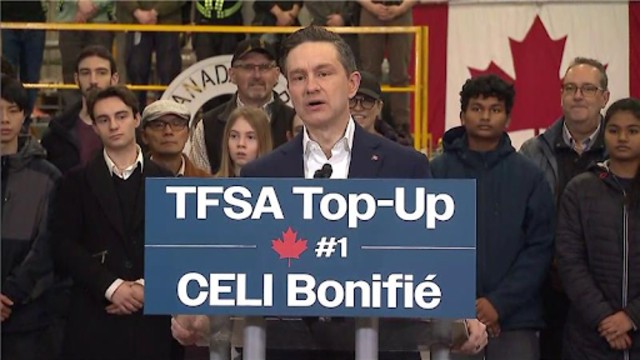
Conservative Leader Pierre Poilievre kicked off his campaign in B.C. on Thursday, highlighting the growing trade conflict with the U.S., reports Joe Sadowski. City News Hailfax
Conservative Leader Pierre Poilievre has promised to increase the limit on tax-free savings accounts (TFSAs) if he wins the upcoming election. His plan aims to encourage Canadians to invest more in local companies, which he says will strengthen the economy and create jobs.
Currently, Canadians can contribute up to $7,000 annually to their TFSAs. This money can be invested in various financial products like mutual funds. Poilievre wants to introduce a TFSA top-up, allowing people to add an extra $5,000 each year specifically for investments in Canadian businesses.
He believes this move will help drive job growth and increase tax revenue by reducing reliance on foreign trade, particularly with the U.S. Poilievre claims the tax system already defines what qualifies as a Canadian investment, but his government would also create clear guidelines for banks to recognize companies supporting local jobs.
His proposal comes at a time when the cost of living is a major issue for Canadian voters. Polls show that inflation and affordability are top concerns in the election. With this plan, Poilievre hopes to offer Canadians a way to grow their savings while boosting the domestic economy.
As part of his economic platform, Poilievre has also vowed to cut the income tax rate. He plans to reduce the lowest tax bracket rate from 15% to 12.75%, aiming to give more relief to working-class Canadians.
Meanwhile, the other major parties have also made key financial promises. Liberal Leader Mark Carney recently announced plans to lower taxes for the middle class by cutting the rate on the lowest federal income bracket by 1%. This could save a dual-income family up to $825 a year. The Liberals have also promised to remove the one-week waiting period for employment insurance (EI) for people laid off due to U.S. tariffs.
The New Democratic Party (NDP) is also focusing on taxes and employment benefits. Leader Jagmeet Singh plans to change the EI system and raise the basic personal amount—the portion of income exempt from tax—for those earning under $177,882. However, he proposes increasing taxes for higher earners.
With the election approaching, financial policies like these are becoming central to party platforms. Each leader is hoping their promises will sway voters struggling with rising costs and economic uncertainty.















